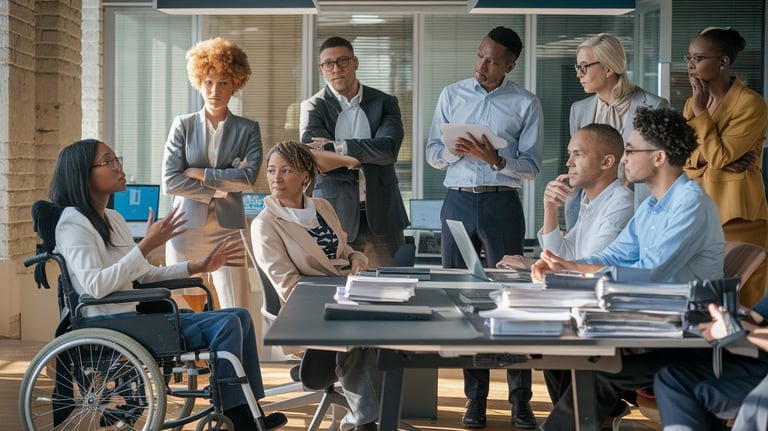The Burden of Expertise: Why Disabled People Shouldn’t Have to Do Everyone Else’s Homework
5 min read
Disabled individuals are often burdened with educating their more resourced managers about their own conditions, despite the readily available information these managers could access themselves. This shifts the responsibility of knowledge onto disabled people, forcing them into unpaid advocacy while simultaneously undermining their lived experiences. Expecting disabled individuals to be experts on their fluctuating conditions while also managing their disabilities is both unrealistic and deeply flawed. Employers and service providers must take accountability for their own learning instead of demanding constant justification from disabled individuals. True support requires proactive education, the use of existing resources, and respect for lived expertise – without subjecting disabled people to unnecessary scrutiny.


Picture this: You’re in a meeting with your manager, or some other entity tasked with “supporting” you. You have a disability, which means you must now play the role of unpaid consultant, unpaid medical researcher, and unpaid patient advocate – and probably all at once.
“Can you explain exactly how your condition affects you?” they ask.
“Have you looked into what accommodations you might need?” they press.
“Are you sure that’s how it works?” they challenge – as if you’ve spent your entire life misinterpreting your own body.
Meanwhile, sitting in front of you is someone with access to vast institutional resources – Occupational Health guidelines, ACAS advice, government reports, and, let’s be honest, the entire internet at their disposal. But instead of taking five minutes to Google your condition, they’ve decided that you – the person already dealing with the realities of your disability – should also be the one responsible for educating them about it.
This isn’t just frustrating. It’s extractive, exhausting, and fundamentally flawed.
The Myth of Disabled Omniscience
There’s a dangerous assumption that disabled people must be the ultimate authorities on their own conditions. The theory goes: it’s your body, so you should know everything about how it works - as if everyone’s an expert in their own anatomy. But even if we were, here’s the thing about disabilities – they aren’t static. They fluctuate, evolve, and sometimes defy even medical understanding. Some days, your symptoms might be manageable; other days, they might be debilitating. You might develop new complications, react differently to medications, or experience sudden shifts that even your doctors can’t fully explain.
And yet, the expectation remains: if you can’t answer every question with perfect precision, then clearly, you don’t know enough about your own disability to be taken seriously. You are expected to be both the expert and the patient, the educator and the advocate – all while institutions with far more resources sit back and demand that you fill in their knowledge gaps.
The Information Asymmetry: Who Really Has the Resources?
So, who actually has access to information?
Occupational Health and HR: They have entire departments dedicated to workplace adjustments and legal compliance.
Government bodies like ACAS: Their entire purpose is to guide employers on employment law, including disability accommodations.
Medical professionals: They have degrees, diagnostic tools, and access to medical literature the rest of us can’t even see without a paywall.
Random strangers with an internet connection: Even they can Google “reasonable adjustments for [insert disability here]” in seconds.
And yet, these same people frequently default to asking disabled individuals to painstakingly explain everything – often multiple times, in different settings, as if they’re cross-examining us for inconsistencies. They could easily take the initiative to self-educate. But instead, they outsource the labour to us, making our ability to access support contingent on our willingness (and capacity) to perform an exhaustive educational service.
Extractive, Not Supportive
This dynamic isn’t just frustrating – it’s damaging. It turns disabled people into perpetual explainers, draining our limited energy just so others can meet a barely minimal level of understanding. And what’s worse? Even when we do provide the information they demand, we’re often met with scepticism.
“Are you sure that’s accurate?” – Yes. And even if it wasn’t, you could check it yourself.
“I read something different online.” – Then why did you ask me in the first place?
“But we’ve never had to make that adjustment before.” – Cool story. Still a legal requirement.
This isn’t merely a lack of knowledge. It’s a refusal to take responsibility. The expectation isn’t just that we explain our conditions – it’s that we prove them. Repeatedly. To people who are already better equipped to find the answers than we are. The absurdity of this is such that it can’t be just carelessness or bad habit. There must be something deeper going on.
Is this ignorance intentional?
So is this level of ignorance deliberate? Surely it must be. It’s not just naivety, incompetence, or even laziness that creates a double bind wherein if you don’t know enough about your disability, you’re dismissed as unreliable, and if you know too much, you’re dismissed as too competent to need support. That’s not an accident – that’s a power move.
For an employer, not knowing – or claiming not to know – works in their favour. If they insist they need more information before making a decision, they can delay offering accommodations. And if they act confused, they can shift the burden of proof onto the disabled person rather than taking responsibility for educating themselves. Ignorance isn’t neutral – it’s a tool that keeps power firmly in the hands of those who already hold it.
And this cycle of constant unnecessary explanation is exhausting. Having to justify and defend your needs over and over again is more than just a bureaucratic headache – it’s emotionally and mentally draining and disproportionally affects the disabled individual.
A Better Approach: Do Your Own Research
If employers, service providers, medical professionals, or anyone else for that matter, actually want to support disabled people, they really need to take accountability for their own learning. That means:
Looking up basic information before demanding unpaid emotional and intellectual labour.
Using institutional resources (which exist for this exact purpose) instead of treating disabled people like walking encyclopaedias.
Trusting the expertise of disabled individuals when they share their lived experience – without interrogating them as if they’re on trial.
And if it is indeed the case that an employer is consciously or unconsciously sucking up the limited and precious time and energy that disabled people could be using to actually do their jobs, let alone just live their lives in this way, then it’s important for disabled people to be aware that not only is expecting disabled people to do all the work more than unfair – it is strategic and exploitative.
This isn’t about disabled people refusing to engage or share their experiences – it’s about shifting the balance of responsibility. Disabled people are the primary sources of their lived experience, but they’re not the only sources of such knowledge. If others have the power and resources to educate themselves, they should use them. And if people truly intend to support disabled individuals, the bare minimum they can do is take responsibility for their own ignorance – rather than treating it as the disabled person’s burden to bear. Disabled people already carry enough.


